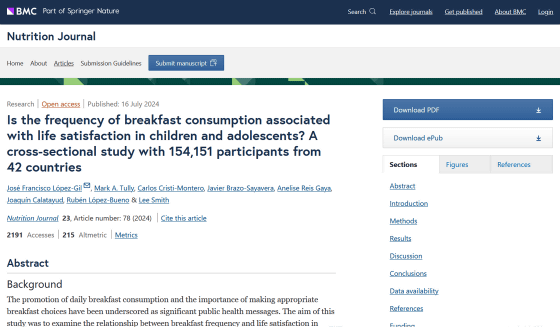Research shows that children who eat breakfast every day have higher life satisfaction

Eating a good breakfast is important for starting your day well, but sometimes it's easy to skip breakfast when you're about to head off to school or work. A new study of more than 150,000 school children in 42 countries found that children who eat breakfast every day have higher life satisfaction.
Is the frequency of breakfast consumption associated with life satisfaction in children and adolescents? A cross-sectional study with 154,151 participants from 42 countries | Nutrition Journal | Full Text

Children who miss breakfast are less happy in life - ARU
https://www.aru.ac.uk/news/children-who-miss-breakfast-are-less-happy-in-life
Kids Who Eat Breakfast Every Day Share Something in Common : ScienceAlert
https://www.sciencealert.com/kids-who-eat-breakfast-every-day-share-something-in-common
Previous studies have linked eating a nutritious breakfast to positive outcomes such as improved memory, improved cognitive function and increased physical activity, while skipping breakfast has been linked to increased depression, stress and psychological distress in people of all ages.
However, the relationship between breakfast frequency and children's life satisfaction has not been sufficiently investigated. Therefore, an international research team from Ecuador, Brazil, the UK and other countries conducted a study on the relationship between breakfast eating habits and life satisfaction.

The data used in the study
The researchers found that children who ate breakfast more often per week were more likely to report high levels of life satisfaction, even after taking into account factors such as gender, age, socioeconomic status, fruit and vegetable consumption, sweet food consumption, frequency of eating meals with their family, physical activity, and body mass index (BMI).
Below is a graph that the research team created, with 'days when breakfast is eaten' on the horizontal axis and 'self-assessed life satisfaction on a scale of 0 to 10' on the vertical axis. The more days breakfast is eaten, the higher the life satisfaction tends to be. Children who do not eat breakfast even once had an average life satisfaction of '5.8', while children who eat breakfast every day had an average life satisfaction of '6.4'.

In addition, the graph below shows the life satisfaction of 'children who did not eat breakfast even once a day' in each country included in the HBSC in purple, and the life satisfaction of 'children who ate breakfast every day' in orange. Although the figures vary from country to country, it can be seen that 'children who ate breakfast every day' have higher life satisfaction in every country. The children with the lowest life satisfaction were 'children who did not eat breakfast even once a day' living in Romania, and the children with the highest life satisfaction were 'children who ate breakfast every day' living in Portugal.

This study only examined correlations, so it is unclear whether eating breakfast directly leads to increased life satisfaction. However, a study conducted in South Korea has shown that eating breakfast also reduces physical symptoms such as fatigue, sleep disorders, nausea, headaches, and fever.
Professor Lee Smith of Anglia Ruskin University, co-author of the study, argues that eating breakfast not only provides the energy and nutrients needed for cognitive tasks, but also that the vitamins and minerals consumed at breakfast, as well as the routine of having breakfast, may be involved in improving life satisfaction. 'We found that in all countries surveyed, people who eat breakfast every day reported higher overall life satisfaction than those who do not eat breakfast at all,' he said.
Related Posts:







